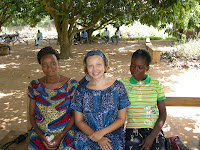
When I lived in Kaboli, Sunday was a day for relaxation. This ideal was taken seriously by the Christians and Muslims of Kaboli. Yet, divisions remained. Importantly, first instance, Muslims do not eat pork.
On most Sundays, I met my friends after mass at a house in the Djama neighborhood. There, we sat under a canopy of mango trees, drank Tchouk, and ate grilled pork. The pork was first boiled, then roasted slowly on the grill, and finally served with some piment (ground red pepper) and sliced red onions. I would try to arrive early so I could claim the meatiest piece—though I still appreciated the juices from a nice chunk of fat cooked along with the meat. A great addition to this little feast was a side order of gari (grated, dried cassave). The gari was cooked in the juices leftover from boiling the pork along with onions, tomatoes, piment, and condiment (ground garlic plus local herbs and spices).
These Sunday afternoons in Djama were not only a great opportunity to get some delicious protein; they were also a great opportunity meet with the people of my community. Friends and acquaintances often encouraged me to talk about life in America. It was especially a nice time to meet with my Togolese counterparts in a more informal setting. Building strong professional relationships in Togo often depends on these friendly, non-work-related meetings.
Yet, Muslims don't eat pork. So I missed my Muslim friends on these Sundays unless they could afford to ask the chef to cook a chicken. On my home, after an afternoon under the mango trees, I tried to make an effort to visit my friend at the bush taxi station.
 My friend is the secretary at the bush taxi station; therefore we call him Secrétaire. He is Muslim. He is young, tall and thin. When he was a child, he was trafficked to Nigeria. He worked for a few years on a farm and, for some reason, always threatens that he will return someday. Working as the secretary of the bush taxi station does not pay well. He works long hours, manning his post from the wee morning hours when the first customers begin to arrive until the night car departs for Lomé around midnight.
My friend is the secretary at the bush taxi station; therefore we call him Secrétaire. He is Muslim. He is young, tall and thin. When he was a child, he was trafficked to Nigeria. He worked for a few years on a farm and, for some reason, always threatens that he will return someday. Working as the secretary of the bush taxi station does not pay well. He works long hours, manning his post from the wee morning hours when the first customers begin to arrive until the night car departs for Lomé around midnight.On Sundays, however, the bush taxi drivers like to steal away from the hustle and bussel, and Secretaire gets a rare break. He invited me to join them at their hide-away one Sunday afternoon. He was concerned, though, because I could not take a motorcycle and he did not have a bike. So we decided to risk the afternoon heat and walk there. We made an appointment to meet at the station at one o'clock in the afternoon.
At one o'clock, Secrétaire still had some business with the car to Tchamba. I was smart and brought a book. At two o'clock, he was finally free. He bought some grilled lamb. Then we set off down the road to Goubi.
We reached the edge of town and kept walking. Eventually we turned down a path that led a few kilometers into the bush. We passed fields of corn, manioc and beans. We passed groves of cashew trees, teak, and finally, we ended our lengthy jaunt in a grove of palm trees. A straw shack and cook stove stood there, but the place was otherwise deserted.
Then, two farmers emerged. They were not the field's owner. However, they had brought a bunch of nuts with them, though I count not identify the variety of nut. They were Kabiye and did not speak Kaboli, but we muddled through with French and they offered us some nuts. They reminded me of chestnuts—large and meaty.
The Kabiye farmers also had several little crabs, which they had caught in their fields and tied up. I reminisced of the crabs from the Chesapeake Bay and missed home. So my friend kindly bought two of the crabs for me to cook at my house.
Soon the field's owner arrived with his wife and two sons. They immediately started to go through the motions for maintaining their production of palm wine. As some of the drivers from the taxi station show up for their day off, they joined in.
At first, everyone was leery of the white stranger—me. So I cracked a joke though and everyone loosened up. I then showed an interest in their production of palm wine.
The farmer bounded a bunch of sticks together and lit one end so that it began to smolder. After checking the container sitting underneath a fallen palm tree to see if any palm juice has collected, we used bamboo straws and the lit sticks to smoke out the tree trunk—sterilizing it as it continues to produce palm wine. Once coming across an older trunk that no longer produced juice, we chipped away at the trunk and dug up fat, squirming maggots.
As the men continued to collect palm wine, the farmer's wife started a fire in the outdoor stove and began to cook the maggots. No oil was added. They quickly shrank in the pan and cooked up crisply in their own fats.
We all settled down together with a calabash of palm wine to a pot-luck lunch of nuts, maggots, fresh roasted mice, and lamb. My new friends were happy to see me taste a bit of everything. It was all very tasty. Each bite imparted a smoky, woodsy flavor. However, I could not get the idea of eating maggots out of my head and stopped after three. The lamb needed a little bit more flavor, but luckily some onion and piment was kept underneath a rock for such gourmet emergencies.
That night, I steamed the crabs with some salt and piment. They were not as meaty as the ones from the Chesapeake Bay, but it was enough for nostalgia's sake.

I'll never forget these Sundays in Kaboli. The food was always interesting, if not delicious. I also made new friends and learned a little of life in Togo.

No comments:
Post a Comment